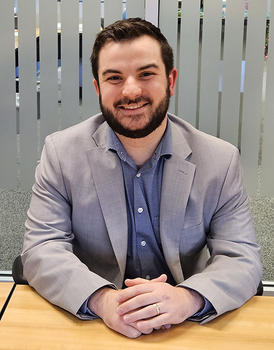In This Story

As Carter N. Coudriet readily points out, his “dream job probably doesn’t exist yet.” But that does not mean that he does not have an excellent job, one that he doubts he would have gotten were it not for his time at the Schar School of Policy and Government at George Mason University.
Coudriet, who graduates in December with a master’s degree in global commerce and policy, works as an export compliance specialist in the Bureau of Industry and Security at the Department of Commerce. In his role, he helps to ensure that dual-use items—those that have both commercial and security applications—are being utilized by other nations in a way that does not pose a security threat to the United States. His position directly builds on his work at the Schar School, where he studied the security implications of international trade.
Coudriet chose the Schar School because he wanted to study how trade fits in with security. He says security is as much about microchips, supply chains, and sanctions as it is about missiles and conventional weapons. The Global Commerce and Policy program offered an ideal setting for discussing and challenging the limitations of hard power and of free trade.
“I brought to my classes a security-minded skepticism of pure free-trade discussions,” he said. “The United States is clearly a beneficiary of global trade, and protecting global trade sometimes requires more aggressive tactics to ensure that others adhere to international rules and norms.”
Coudriet worked closely with a diverse array of faculty to further his intellectual framework. His academic career has a natural arc, in which various activities seamlessly grew and led to additional opportunities. After writing a brief in his Intelligence Analysis Class taught by Professor Ellen Laipson and Distinguished Visiting Professor Michael Morell, Coudriet continued to work with Morell to revise the piece and get it published in The Cipher Brief. Throughout this collaboration, Coudriet was astounded by the amount of time that a two-time former acting director of the Central intelligence Agency was willing to give to a graduate student and by how seriously Morell took his ideas. For her part, Laipson, the former vice chair of the National Intelligence Council, added Coudriet as a Student Fellow at the Schar School’s Center for Security Policy Studies (CSPS). As a fellow, he helped organize CSPS’s fall 2022 symposium on the Arctic.
At the macro level, Laipson valued the energy and passion that Coudriet brought to the conference; more tangibly, she valued his suggestions for speakers and panels. At the symposium, Coudriet asked a question of one of the panelists, on human capital development in the Arctic, which then became the basis of an independent study he undertook with Professor Ken Reinert. Reinert has offered to work with Coudriet to try to publish the paper that came out of the semester-long project.
“His research skills are fantastic, and he applies these in creative ways to help us better understand the human elements in the growth and development of the Arctic,” Reinert said of Coudriet.
All of this leads back to the aforementioned perfect job. For Coudriet, that would be at the Arctic-focused nexus of trade and national security. He is fascinated by the extent to which this region can emerge as more than a hub for natural gas and minerals and ultimately develop an economy and trade centered around human creativity and entrepreneurialism. Such a move could have significant geopolitical ramifications, including potentially weakening the relative influence of Russia and increasing that of the seven market economies that already have a substantial footprint in the Arctic. Many have focused on the shipping routes to the Arctic that will emerge as the ice in the region continues to melt; others have focused on Russia’s collaboration with China to build liquified natural gas production facilities.
Coudriet has so enjoyed working with Schar School faculty to examine the security implications of this trade and economic arms race that he hopes to continue collaborative research on the Arctic postgraduation. Wherever his intellectual fascination leads him professionally, he says has been given a “gift” of an extraordinary education.
“One in which my professors taught me that I could have a career thinking about the kinds of things that I think about,” he said.
